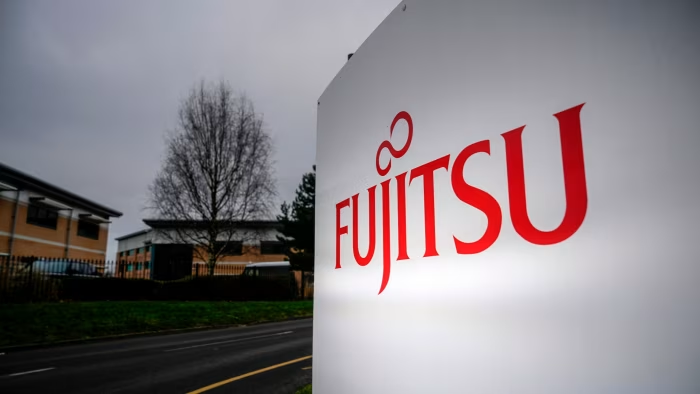Princess Eugenie is not…
Blog
-

Boss of company linked to Post Office scandal gets 50% pay rise
Unlock the Editor’s Digest for free
Roula Khalaf, Editor of the FT, selects her favourite stories in this weekly newsletter.
The head of the UK arm of Fujitsu, the technology group at the centre of the Post Office Horizon scandal, received a 50 per cent pay rise last year as its parent company injected fresh capital to offset falling orders and reputational damage.
Accounts for UK-based Fujitsu Services, a subsidiary of the Japanese IT services company, show its highest-paid director — understood to be UK head Anwen Owen — earned £591,000 in the year to March 2025, up from £388,000 a year earlier. Owen, a former senior civil servant who joined the UK company’s board in 2022, previously held roles at the Treasury and Cabinet Office.
According to the accounts, Fujitsu’s parent injected £80mn into the business to “strengthen the balance sheet” and support operations, following a £200mn capital infusion the previous year.
Revenues fell 9.2 per cent to almost £1.1bn, while profit recovered to £15mn from a loss the year before. However, the company’s order pipeline contracted by a fifth to £904mn, with management warning that the “loss of future new business due to reputational damage arising from the Horizon inquiry remains a key risk”.
More than 900 sub-postmasters were wrongly prosecuted between 1999 and 2015 due to faults in the Horizon computer system, which was developed by Fujitsu and falsely showed accounting shortfalls. More than 230 sub-postmasters were jailed, and at least 13 are believed to have taken their own lives.
In its latest filings, Fujitsu said it “continues to support the inquiry process until its conclusion” and is “engaging in discussions with the UK government regarding an appropriate and proportionate contribution” to compensation for victims.
The company said ahead of the inquiry’s final findings, “it is not possible to estimate the amount of a future financial contribution” and therefore no provision has been made in its balance sheet.
The pay rise and cash injection were first reported by the Times and the Sunday Telegraph.
Fujitsu has suspended bidding for UK government contracts until the conclusion of the public inquiry into the Horizon system.
The company told the Financial Times that it continued to work with the government “to ensure we adhere to the voluntary restrictions we put in place regarding bidding for new contracts” and was “engaged with government regarding Fujitsu’s contribution to compensation”.
It added that “improved operating margins and the successful delivery of strategic cost reduction measures” had helped boost pre-tax profits.
“We remain focused on supporting our UK customers, through the delivery of innovative IT services and solutions,” the company said.
The UK government last week pledged to improve the compensation schemes for victims of the Horizon scandal. Business secretary Peter Kyle said ministers would create an appeals process for sub-postmasters who accepted fixed-sum payments under earlier settlements, allowing them to pursue full, evidence-based redress.
The first report of the public inquiry, released in July, found that both Post Office and Fujitsu employees were aware of serious flaws in the Horizon system but “maintained the fiction” that it was reliable. The government has accepted all but one of the inquiry’s 19 recommendations, including proposals for an independent body to oversee redress in future cases.
Fujitsu’s accounts also disclose a £4mn damages claim filed by a former sub-postmaster in July. Fujitsu does not identify the claimant, but media reports have linked the case to Lee Castleton, whose story featured in ITV’s Mr Bates vs the Post Office. The company said it was “not yet possible to predict the outcome” of the case.
Continue Reading
-

ARY Digital launches new daily fiction ‘Chaalbaaz’
ARY Digital has premiered its latest drama series, ‘Chaalbaaz’, which began airing on Saturday, 11th October 2025, and is broadcast daily at 19:00.
Written by Rakshanda Rizvi and directed by Rao Ayaz, ‘Chaalbaaz’…
Continue Reading
-

The Targeted Pulse: Updates in Lung, Breast, and Skin Cancers | Targeted Oncology
Welcome to this week’s edition of The Targeted Pulse, your weekly wrap-up of the top developments in oncology. This week, we saw several breakthroughs in targeted therapies and FDA decisions, bringing renewed hope to patients and clinicians alike. From regulatory designations for promising new drugs to crucial clinical trials, here are the top stories that shaped the week.
Low-Dose Nivolumab Offers Novel Strategy for Hodgkin Lymphoma Treatment A phase 2 study found that a low-dose regimen of the immunotherapy drug nivolumab (Opdivo; 40 mg) combined with lenalidomide is a highly effective, chemotherapy-free strategy for classical Hodgkin lymphoma (cHL). The combination achieved an overall response rate of 90% with a favorable safety profile.
Crucially, researchers observed that the 40 mg dose was sufficient to achieve complete PD-1 receptor occupancy, suggesting that the standard, higher nivolumab dosing may be excessive. The findings advocate for using pharmacodynamic biomarkers to guide personalized, cost-effective dosing schedules. This evidence-based approach challenges traditional dosing models, offering a path to significantly reduce treatment costs and improve global access to nivolumab, especially in resource-limited areas. A phase 3 trial is currently underway to compare this novel low-dose regimen with the standard ABVD chemotherapy.
FDA Approves Lurbinectedin/Atezolizumab for ES-SCLC Maintenance The FDA has approved the combination of lurbinectedin (Zepzelca) and the immunotherapy atezolizumab (Tecentriq) for first-line maintenance treatment in patients with extensive-stage small cell lung cancer (ES-SCLC). This regimen is for patients whose disease has not progressed after initial induction therapy.
The approval is based on the phase 3 IMforte trial, which demonstrated statistically significant improvements in survival. Compared to atezolizumab alone, the combination reduced the risk of disease progression or death by 46% and the risk of death by 27%, with a median overall survival of 13.2 months. This maintenance strategy addresses a critical need in ES-SCLC to proactively prevent aggressive relapse.
FDA Approves Cemiplimab for Adjuvant Cutaneous Squamous Cell Carcinoma The FDA has approved the immunotherapy cemiplimab-rwlc (Libtayo) as the first and only adjuvant treatment for adults with high-risk cutaneous squamous cell carcinoma (CSCC) following surgery and radiation.
This approval is based on the phase 3 C-POST study, which demonstrated that cemiplimab significantly improved disease-free survival (DFS). The treatment reduced the risk of cancer recurrence or death by 68% compared with placebo, addressing a critical unmet need for patients with a high risk of relapse. The findings also showed an 80% reduction in locoregional recurrence risk, marking a practice-changing milestone in preventing recurrence for this vulnerable population.
Orca-T Earns FDA Priority Review in Heme Malignancies The FDA granted priority review to the biologics license application (BLA) for Orca-T, an investigational allogeneic T-cell immunotherapy for treating high-risk hematologic malignancies, including AML, ALL, and MDS. The priority review is based on data from the phase 3 Precision-T study. This trial showed that Orca-T significantly improved patient outcomes compared to standard allogeneic hematopoietic stem cell transplant (alloHSCT), particularly in achieving survival free of chronic graft-vs-host disease (cGVHD). Specifically, Orca-T achieved a high survival rate with a much lower incidence of moderate to severe cGVHD (13% vs 44%). This milestone aims to provide a potentially curative option with reduced treatment-related complications.
Dato-DXd Delivers Significant TNBC Survival Benefits in Phase 3 Trial The antibody-drug conjugate (ADC) datopotamab deruxtecan (Dato-DXd; Datroway) showed statistically significant improvements in both overall survival (OS) and progression-free survival (PFS) for the first-line treatment of metastatic triple-negative breast cancer (TNBC). The pivotal phase 3 TROPION-Breast02 trial demonstrated that Dato-DXd was superior to standard chemotherapy for patients for whom immunotherapy was not a treatment option. This is the first trial to show an OS benefit in this challenging patient population, suggesting a potential shift in the standard of care for a disease often associated with a poor prognosis.
Continue Reading
-

Qualifier Valentin Vacherot triumphs in all-cousin final against Arthur Rinderknech
From alternate to qualifier, Valentin Vacherot is now the champion of the 2025 Shanghai Masters.
The Monegasque came from a set down to become the first tennis player from Monaco to win an ATP title, even more extraordinarily against his cousin,…
Continue Reading
-

Weather Watch: United States Grand Prix 2025 forecast
Formula 1 begins a run of races across the Americas this week, aptly kicking-off at the Circuit of the Americas.
A visit to COTA is always popular with drivers, teams and fans alike, and most of the time, there’s not been the need to pack…
Continue Reading
-

Trump officials reportedly consider selling student loan debt to private investors | Trump administration
Officials in the Trump administration are reportedly weighing the possibility of selling portions of the federal government’s $1.6tn student loan portfolio to private investors, which experts say could carry risks for both taxpayers and borrowers – potentially reshaping the student loan landscape in unpredictable ways.
Senior officials at the education and treasury departments have been engaged in internal conversations about offloading select, high-performing segments of the government’s student debt holdings, according to a Politico report this week. These loans are part of the larger portfolio owed by roughly 45 million borrowers nationwide.
Administration officials have also reportedly reached out to figures in the financial industry, including potential buyers, to discuss the idea. The deliberations, which began earlier this year, initially included “department of government efficiency” (Doge) officials stationed at the education department but are now being guided primarily by senior political appointees.
It’s unclear how far the administration will take the idea, or which parts of the $1.6tn portfolio could be put on the market.
Daniel Zibel, vice-president and chief counsel at the National Student Legal Defense Network, described the proposed loan sale as a “complex and unprecedented” idea, essentially the reverse of the 2008 financial crisis, when the government bought privately held loans to stabilize the market.
“The system for student debt is incredibly complicated, and for the administration to do this in a way that lives up to the protections that exist in the law for student loan borrowers makes it even more complicated,” Zibel said.
Selling them off now, he said, would shift repayment and management responsibilities to private entities, raising questions about enforcement, oversight, and the continuity of borrower protections. It could also eliminate the government’s power to cancel the loan.
“If you’re talking about unilateral cancellation, like what president Biden had been talking about, the department would certainly lose all authority to tell a private company that they had to cancel a debt,” he said.
The sale proposal aligns with the administration’s broader goal of reducing the federal footprint in the student loan system and encouraging more private-sector involvement. It could also explain why the Trump administration was so eager to roll back the loan forgiveness offered by the Biden administration.
“Now we know why President Trump and Secretary [Linda] McMahon are hell bent on squeezing every last dollar out of families with student debt,” Mike Pierce, executive director of Protect Borrowers, said in a statement. “Once again, we see that across the Trump Administration, when Wall Street’s demands run against the financial needs of working people, the banks get what they want.”
Michele Zampini, associate vice-president of federal policy at the Institute for College Access and Success, says the plan is likely linked to the Trump administration’s broader ideological aim of shrinking or dismantling the education department.
“This is all part of that same conversation, because the department manages this huge, billion plus dollar loan portfolio,” Zampini said. “You can’t really wind down the department while still having responsibility for this type of loan portfolio. It’s driven by their desire to wind down the department more broadly. This is the roadblock in their way in many senses.”
Any attempt to sell off federal student loans would raise major legal and logistical questions. Borrowers could face uncertainty about whether current consumer protections, often more favorable than those offered in the private market, would remain intact. It’s also unclear whether the government would continue to guarantee the loans.
Zampini adds that the move would put borrower protections at particular risk “because there’s really no precedent for this”.
“There is no indication that there is, first of all, interest from the private market. And if there is interest, their interest would likely be to squeeze as much profit from the repayment as they could,” she said. “And so the interest of a private purchaser and a private investor would very likely not be to provide borrowers with any type of generous benefits or relief programs.”
This is not the first time the idea has surfaced. During Trump’s first term, the education department hired consulting firms to evaluate the student loan portfolio and estimate its potential sale value. That analysis revealed the loans were worth substantially less than government accountants had assumed, and the plan was shelved as the Covid-19 pandemic upended the economy.
Now, with Trump back in office, the administration appears to be reviving the concept as part of a broader rethink of the student loan system. Officials are reportedly exploring whether to transfer management of the loan portfolio, or segments of it, from the education department to the treasury department, an idea seemingly consistent with Trump’s stated desire to close the education department altogether.
“I don’t think this is driven by an interest in helping borrowers,” Zampini said. “Certainly, I don’t think it’s driven by an interest in improving the program. And I also don’t think it’s driven by an actual interest in saving taxpayers money. I think it’s driven mostly by a political interest.”
The potential sale is only one part of a sweeping effort to overhaul the student loan system. The administration has already rolled back nearly all Biden-era policies that offered loan forgiveness or expanded repayment options. It has also resumed collecting defaulted loans for the first time since March 2020, when the pandemic prompted a nationwide pause.
Still, it’s not completely clear how feasible these plans are under the current legal system.
“The law does specifically allow the secretary of education to work with the treasury department to sell loans,” Zibel said. “But it very clearly says that the secretary has to determine that it is in the best interest of the United States to do so, but also that there will not result in any cost to the federal government.”
The concerns are not just that current borrowers might be at risk of losing their protections, but that a student loan market controlled by private entities would increase the barriers to attend college.
“The federal student loan program is unique because the loans are not originated with the goal of making a profit on them,” Zampini said. “They are essentially an access tool to enable people to go to college who wouldn’t necessarily be able to access that same credit in the private market.
“All of those factors make them a lot less likely to generate a return for an investor. And so it’s hard to see how someone looking to make a return on these loans, on this portfolio, would do anything but increase as much as they can the amount of payment and decrease the relief programs and the flexibilities that the federal government offers.”
Continue Reading
-

Study Reveals ‘Alarming’ Rise of Superbugs in Newborn Babies : ScienceAlert
Humanity’s war against drug-resistant microbes is not going very well.
Antibiotic resistance has rapidly become one of our species’ leading causes of death, claiming an estimated 5 million lives globally in 2019. That already exceeds the…
Continue Reading
-

From the Archives: Victoria Beckham on Finding Her Life’s Passion
Like many women designers, Victoria approaches her work in a way that’s uniquely personal and subjective. “I’ve always had to make the best of what I’ve got,” she tells me. “I’ve never been a six-foot-tall, skinny model [she is five feet…
Continue Reading
-

32in mountain bikes are here, but brands need to learn from the lessons of 29ers first
Zinn Cycles’ B.I.G. 32er is one of the first production full-suspension mountain bikes to be fitted with 32in wheels; a diameter starting to gather momentum in the industry.
Specifically, however, the B.I.G. is designed for riders 193cm tall and…
Continue Reading
